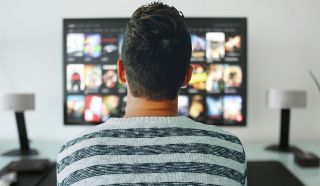Media
Why We Love to Hate Reality-TV Contestants
Psychology explains why we judge instead of empathize.
Posted August 21, 2023 Reviewed by Gary Drevitch
Key points
- According to evolutionary psychology, humans regulate each other's behavior to limit transgressions.
- Because of the fundamental misattribution bias, we don't consider context when evaluating people's actions.
- We equate fame with happiness and wealth, and generally dislike it when celebrities talk about hardships.

While many enjoy watching reality television, not as many have empathy for the people providing them the entertainment. This is becoming more and more apparent with the intense and aggressive (and at times even threatening) public comments shared after episodes are aired. Reality TV contestants have shared some of the critical, cruel, and frightening messages they've received from complete strangers, usually on social media, and it's not just one person or one time. Behind the anonymity of a screen and a concealing username, people feel far too free to lash out at reality TV personalities, both famous and relatively obscure.
Why do people do this? Why is it hard to see reality-television cast members as real people with real feelings and struggles? And what needs to be done to move us from condemnation toward compassion?
Here are three psychological concepts that can help us understand this phenomenon, and what a better response would be.
Society Self-Regulates
As evolutionary psychology posits, humans behave in ways that enhance survival and reproduction, and for much of our history, that has meant a reliance on social groups. Before modern-day living, humans depended on the safety and support of small groups to ensure survival, which also meant it was critical that members of the group followed its code of conduct. Anyone who violated the code was punished so that they and others would remember to work together and not transgress.
Public backlash is the modern-day version of punishing those who violate our code of conduct. Strangers admonish the reality TV contestant who lies to get ahead because lying violates our code. They shame the reality TV contestant who flirts when they're in a relationship with someone else because infidelity violates our code. And the list goes on.
The problem is that we are no longer in small bands trying to survive each day, and punishment as a way of regulating behavior cannot and should not be enforced by complete strangers. If anyone should be reprimanding contestants, it is the other contestants, as they are the ones who had to personally experience and manage the transgression. However, reality television makes viewers feel like part of the inner circle because think we see all of the cast's private moments and interactions, and this makes us feel entitled to participate in regulating their behavior. Remember, though, that we actually aren't entitled to this, especially not when it is done in an overly harsh or threatening manner.
And, also important to note, the shows are heavily edited, and people can't be sure they're reprimanding cast members for something they actually did. More often than you'd think, the editing makes it look like something happened when nothing did, and then cast members are left defending themselves even though they did nothing wrong.
The Impact of the Fundamental Misattribution Error
This psychological concept states that we view other people's behaviors as an indication of their character ("That person cut me off in traffic when I was trying to turn; they're a jerk!") but when considering our own behaviors we factor in the context and situational factors ("I cut that person off in traffic because I'm late for a really important meeting; I'm a good person and usually I'd never do that!").
We do this with reality TV cast members, too. When we watch a contestant make a bad decision, we see it as reflective of who they are as a person and don't consider the context. We imagine they're selfish or impulsive instead of thinking about how the conditions of the show are impacting their behavior (i.e., they're probably sleep-deprived, hungry, or anxious).
Watching people on TV is a perfect opportunity for the fundamental misattribution error, partly because shows edit people to make them appear a certain way and leave out the rest. It's easy to forget the context (they've been awake since 5 am filming in the hot sun) when we don't see it. So remember, you need to consider the external factors influencing their behaviors, and not jump to conclusions about who they are.
The Illusion of Fame as a Fix
We equate fame with fortune and happiness, wealth, endless opportunity, and a higher level of contentment, but research — and the firsthand accounts of celebrities themselves — has shown that fame and fortune cannot insulate anyone from life's woes and struggles.
When we see a reality TV personality draw a large social media following, score a big brand promotion, or get other unique opportunities, we think they have it good. And in many ways, compared to others, they do. But this illusion prevents us from seeing that they still have struggles: mental health issues, relationship problems, or even financial concerns. (Having a big Instagram following doesn't mean you're automatically rich.)
Then, when we see contestants talk about those struggles, we tend to get annoyed. The common refrain is, "Why are they complaining? They got so much out of being on the show." And yes, some people do get a lot, but the majority of cast members don't — you don't even know who some of them are since they don't make the cut out of the editing room — and even those who are in the main cast can still have had adverse experiences or continue to suffer post-show.
Having a large social media following or being featured in popular magazines does not mean that cast members are happy or have it easy. Many have lost jobs and relationships, struggled with anxiety or depression, and experienced low self-esteem after being on a show; money and fame don't prevent or fix that.
The Takeaway
Humans have evolved to regulate others' behavior, we see the context in our behavior and forget to see it when others behave poorly, and we look at fame as a cure-all. These three tendencies make it easy for us to judge and dislike reality-television cast members. However, the better response is empathy and curiosity instead of criticism and vitriol. We may feel we have an accurate window into their inner worlds, but we don't. Shows are edited and social media is curated, so we don't know what people are actually going through.
Viewers should take an approach of being curious and empathic and maintaining humility in knowing that we truly don't know what cast members have experienced or are currently going through.




